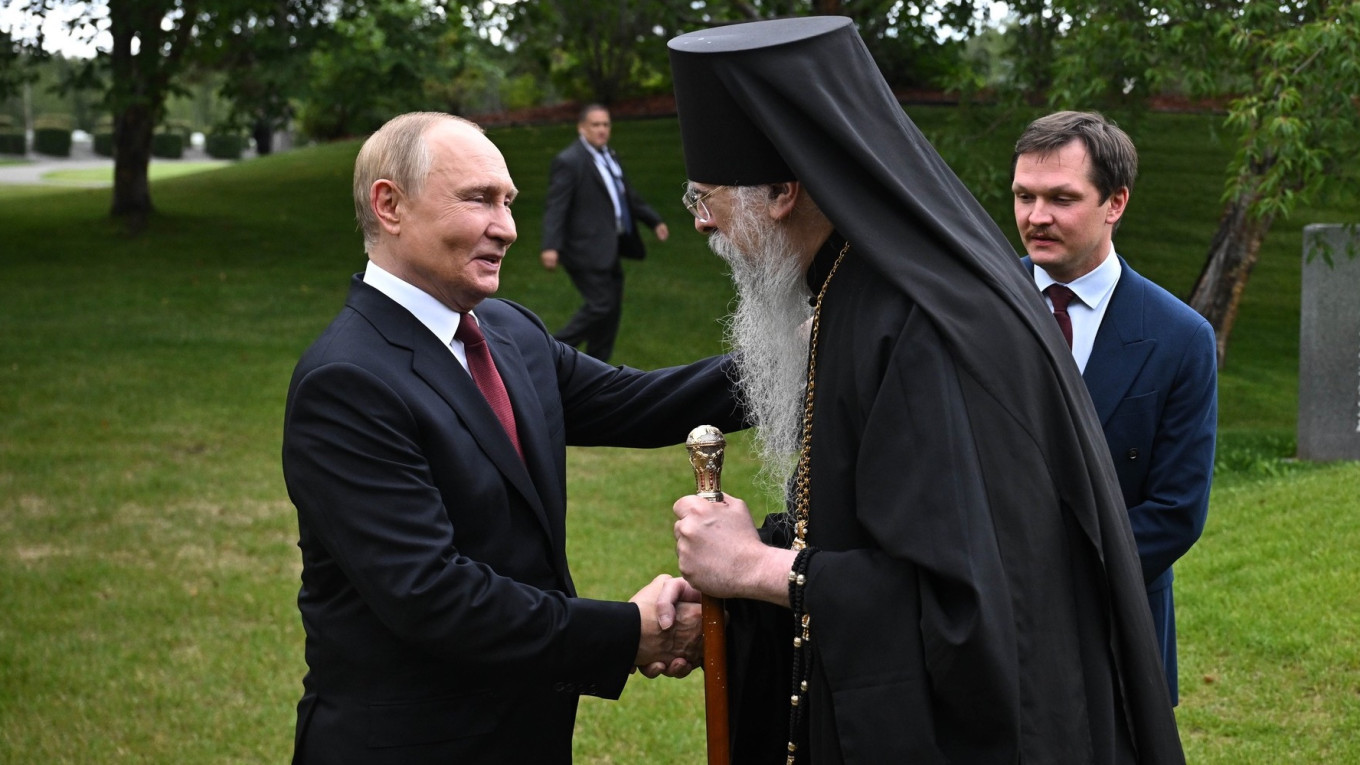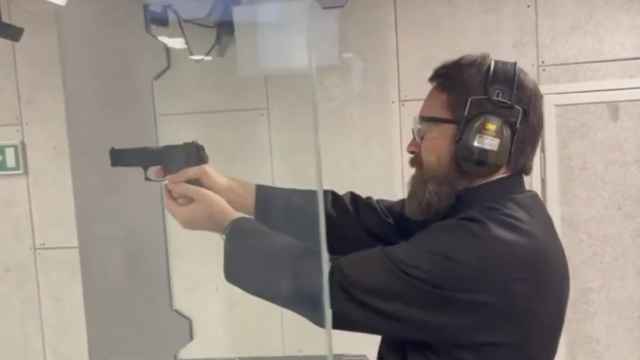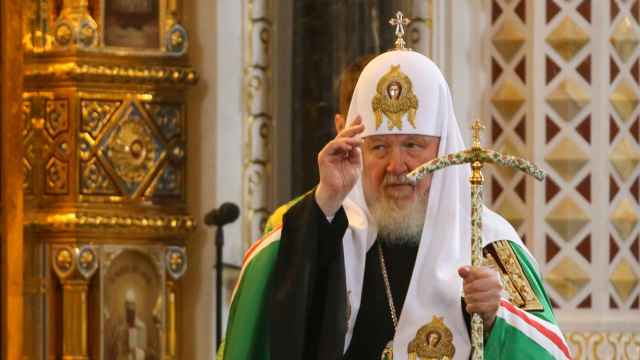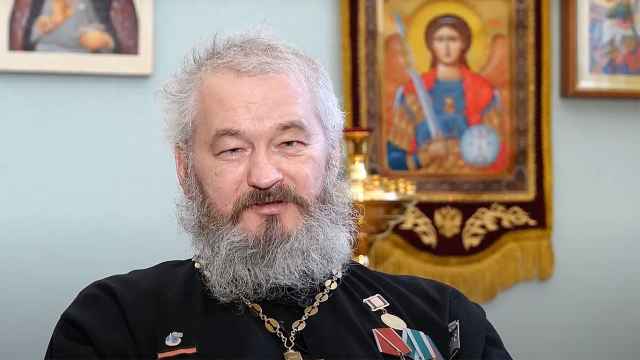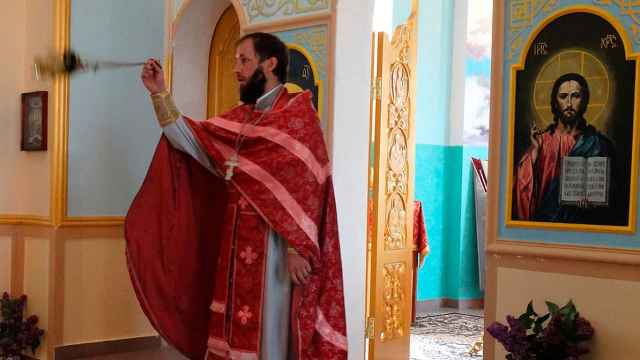After talks with U.S. President Donald Trump in Anchorage, Vladimir Putin met with Archbishop Alexei of Sitka and Alaska. The Russian president told the clergyman that before heading to America, he had met with Patriarch Kirill.
It is unclear whether the meeting with Patriarch Kirill actually took place. Neither the Kremlin website nor the Moscow Patriarchate website mentions it. What is clear is that the Moscow Patriarchate was involved at least in rallying the church to offer spiritual support for the negotiating team and that the Kremlin-linked church’s soft power extends into the U.S.
On the eve of the talks, Patriarch Kirill held a service in the house chapel of his Chistiy Pereulok residence, prayed for Putin and for the summit to bring: “a fundamental change in relations between the two great nuclear powers and the establishment of a new type of relationship aimed at ensuring the welfare and peace of our planet.”
A directive was clearly set out to dioceses across Russia to pray for an end to the war. Bishop Pankraty, abbot of Putin’s beloved Valaam Monastery, gave a sermon saying “the outcome of these talks will affect how soon brotherly blood ceases to be shed” and expressed the wish that they result in peace on earth.”
These might seem like natural words for Christian clergy. But that they are being spoken en masse and simultaneously for the first time since the war began is clear evidence of an agenda. Previously, using the word “peace” instead of “victory” in a prayer could get a priest defrocked, as in the case of Reverend Ioann Koval.
The Russian Orthodox Church (ROC), like state propaganda, presented the meeting with the U.S. president as a fateful event for the country — one that could not take place without church attention and support.
During his short U.S. visit, Putin gave the Archbishop of Alaska two icons: St. Herman of Alaska — whose Orthodox feast day was when the location of the talks was announced — and the Dormition of the Mother of God, whose feast day coincided with the date of the summit.
When presenting the icons, Putin crossed himself and kissed them, demonstrating confident familiarity with Orthodox etiquette. Archbishop Alexei received him warmly and said he tries to visit Russia annually. In May, he attended Patriarch Kirill’s name day celebrations in Moscow and traveled through Siberia a year earlier.
Archbishop Alexei is an American — born as John Trader — who converted to Orthodoxy from a Protestant family. He does not speak Russian and serves in the Orthodox Church in America (OCA), which has been formally independent from the Moscow Patriarchate since 1970.
Orthodoxy in America began as the faith of Russian colonists. But even the future Patriarch Tikhon, who headed the North American diocese of the then-imperial Synodal Russian Orthodox Greek-Catholic Church at the turn of the 20th century, believed that America should have its own church — one incorporating the traditions of all Orthodox peoples in the U.S. This vision was partly realized by prominent clergy who were descendants of Russian émigrés.
The intellectual architect of the OCA is considered to be religious philosopher and theology professor Protopresbyter Alexander Schmemann, whose books became intellectual bestsellers in Russia in the 2000s. In the mid-1960s, the self-standing North American Metropolia — existing in a gray zone in church law — joined the Moscow Patriarchate to obtain official autocephaly. This was granted in 1970, aligning American interests with the diplomatic aims of Metropolitan Nikodim, then in charge of the ROC’s foreign policy. Nikodim’s goal was to block the creation of an independent American church under the Greek Ecumenical Patriarchate — or at least to secure an alternative — and, as it turns out, to establish a foothold of influence that has only grown stronger over time.
Most local Orthodox churches still do not recognize the OCA’s independence from Moscow, considering it part of the ROC. Over the decades, the OCA became an American church, with many converts from Protestant denominations (Orthodox Christians make up about 1% of Americans). Services are mostly in English, the calendar follows the Gregorian style, with statutes that are much more democratic than in the ROC. But the genetic link to Russia remains.
In recent decades, after the fall of the Iron Curtain and the passing of the first generation of OCA clergy, this link has strengthened. The passing of generations meant that the majority, including among clergy and bishops, became English-speaking Americans without ingrained suspicion toward Soviet power or Russian politics — but with a romanticized image of Russia as a bastion of spirituality. Some conservative Americans convert to Orthodoxy because they see it as a historic form of Christianity that upholds traditional values and resists social progressivism.
During the war, the OCA took a wait-and-see approach. In 2022, current Metropolitan Tikhon condemned the violence and urged Putin to stop the military action. But when, in July 2025, a group of Orthodox clergy and laity issued an open letter to the All-American Council calling on the bishops to defend political prisoners and persecuted anti-war priests in Russia, the response was silence.
This outraged parishioners and clergy of the Ukrainian Orthodox Church in the U.S. (under the Ecumenical Patriarchate). Its head, Metropolitan Daniel, issued a statement, accusing the Archbishop Alexei of “Greeting a Dictator as a Betrayal of Christian Witness.”
“At a time when the Russian regime is responsible for the deaths of hundreds of thousands, the disappearance of countless innocent people, the breakup of families, and the deliberate destruction of Ukraine, to offer words of greeting and admiration to its leader is nothing less than complicity in a lie,” he wrote.
A week later, apparently in response to Ukrainian protests, the OCA’s official website published an apology from Archbishop Alexei, couched in vague terms, asking forgiveness “from all whose feelings were hurt or who were troubled” by his actions.
Both the archbishop and Metropolitan Tikhon, who prefaced the apology with his own introduction, spoke of peace in general terms, condemning war and violence in the abstract. There was no censure of the archbishop for his cordial meeting with the chief instigator of this war or for exchanging gifts with him.
Moreover, Metropolitan Tikhon expressed support for the Ukrainian Orthodox Church and its head, Metropolitan Onufry — recently stripped of Ukrainian citizenship — as representatives of the Ukrainian people, without mentioning the Orthodox Church of Ukraine (whose clergy are tortured in Russian-occupied territory) or the Ukrainian Greek Catholic Church. This shows the OCA is deliberately sticking to a pro-Moscow position and refuses to recognize the Orthodox Church of Ukraine to the point of denying its members sympathy or support.
The Orthodox Church in America — like many Orthodox jurisdictions worldwide, regardless of their administrative structures or formal ties to the Moscow Patriarchate — has become one of Russia’s most effective tools of “soft power.” This is all the more so because Putin successfully positions himself as the defender of canonical Orthodoxy, a stance that resonates with conservative audiences in many countries.
This article was adapted from the original published by the Sakharov Review.
A Message from The Moscow Times:
Dear readers,
We are facing unprecedented challenges. Russia's Prosecutor General's Office has designated The Moscow Times as an "undesirable" organization, criminalizing our work and putting our staff at risk of prosecution. This follows our earlier unjust labeling as a "foreign agent."
These actions are direct attempts to silence independent journalism in Russia. The authorities claim our work "discredits the decisions of the Russian leadership." We see things differently: we strive to provide accurate, unbiased reporting on Russia.
We, the journalists of The Moscow Times, refuse to be silenced. But to continue our work, we need your help.
Your support, no matter how small, makes a world of difference. If you can, please support us monthly starting from just $2. It's quick to set up, and every contribution makes a significant impact.
By supporting The Moscow Times, you're defending open, independent journalism in the face of repression. Thank you for standing with us.
Remind me later.



